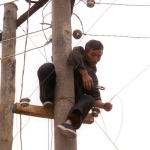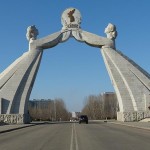- DETERRENCE: Rapid Relief and Reconstruction in a DPRK Humanitarian Energy Crisis
- DPRK: N Korea repeats call for suspension of US-S Korean drill
- GOVERNANCE AND CIVIL SOCIETY: South Korea proposes unification charter
- CLIMATE CHANGE ADAPTATION: The Global Politics of Climate Change: Challenge for Political Science
 DETERRENCE: Rapid Relief and Reconstruction in a DPRK Humanitarian Energy Crisis, NAPSNet Special Reports, December 23, 2014
DETERRENCE: Rapid Relief and Reconstruction in a DPRK Humanitarian Energy Crisis, NAPSNet Special Reports, December 23, 2014
Vulnerable populations, brittle sectors, and deficit regions in the DPRK may experience energy system-wide shocks—the irreparable failure of the distribution system in extreme cold, for example—that would demand a massive humanitarian energy relief operation at a time of high tension but not actual war. About 2 million TOE would be needed for a 3 month winter survival crisis.
- An Updated Summary of Energy Supply and Demand in The Democratic People’s Republic Of Korea (DPRK), David F. von Hippel and Peter Hayes, published as Hanyang University Center for Energy Governance and Security Working Paper 2014-2.
- Report of the commission of inquiry on human rights in the Democratic People’s Republic of Korea, A/HRC/25/63, February 7, 2014
- UN Office for the Coordination of Humanitarian Affairs, Energy Security and Humanitarian Action: Key Emerging Trends and Challenges, OCHA Occasional Policy Briefing Series #3,
- Energy for the Warfighter, Operational Energy Strategy, US Department of Defense, 2011
“N Korea repeats call for suspension of US-S Korean drills” Asiaone. (19 January 2015).
North Korea’s attempts to talk to hold direct talks with the US have so far been unsuccessful. North Korea wants the talks for a variety of reasons: security assurances, seeking a changed international environment, attracting investment to revive a moribund economy, among others. However, there are reasons to believe North Korea actively pursues its own interests which invites other countries to band together in common defense.
- How has the commodity bust affected North Korea’s trade balance (Part I). Kevin Stahler, North Korea: Witness to Transformation. (20 January 2015)
- S.Korea, US, Japan to share intel on North Korea. Hyung-Jin Kim, Associated Press. (26 December 2014)
- NSA was tracking North Korea back in 2010, docs reveal. Michelle Meyers, C Net (19 January 2015)
 GOVERNANCE AND CIVIL SOCIETY: South Korea proposes unification charter, Leo Byrne, NKNews.org (19 January 2015)
GOVERNANCE AND CIVIL SOCIETY: South Korea proposes unification charter, Leo Byrne, NKNews.org (19 January 2015)
ROK ministries presented proposals to promote Korean unification, including seemingly unrealistic proposals such as a railway from Seoul through the DPRK by this summer. Proposals also called for cultural centers to be opened in both countries and a law to lay the foundation for unification. While the President is urging the ministries to find ways to encourage the DPRK to engage in talks, the ROK also deported an American for pro-North views.
- Seoul proposes linked railroads with North, Ser Myo-ja and Jeong Won-yeob, Joongang Ilbo (20 January 2015)
- Gov’t split on resuming Mt. Kumgang tour, Ser Myo-ja, Joongang Ilbo (21 January 2015)
- American set to be deported from South Korea for pro-North views, Anna Fifield and Yoonjung Seo, Washington Post (8 January 2015)
CLIMATE CHANGE ADAPTATION: The Global Politics of Climate Change: Challenge for Political Science, Robert O. Keohane, the 2014 James Madison Lecture, American Political Science Association (January 2015)
From a political standpoint, expenditures on adaptation are entirely different from emissions taxes or higher energy prices as a result of cap-and-trade policies. Adaptation requires new infrastructure, and building infrastructure generates jobs and profits. Indeed, adaptation perfectly fits what pluralist democracies do best: respond to directly affected concentrated and organized interests with targeted benefits, and pay off other organized groups with benefits of their own.
- Political Theory and Global Climate Change, Steve Vanderheiden (editor), the MIT Press, Cambridge MA, USA (September 2008)
- The Politics of Climate Change, 2nd Edition, Anthony Giddens, ISBN: 9780745655147 (September 2011)
The Nautilus Peace and Security Weekly Report captures multiple perspectives on six threats to global security. Our contributors select items that highlight the links among these themes.
Subscribe to NAPSNet to receive free weekly email reports.
Contributors:
- Deterrence: Peter Hayes
- DPRK: Roger Cavazos
- Governance and Civil Society: Dyana Mardon
- Climate Change Adaptation: Saleem Janjua
- Austral Peace and Security: Richard Tanter
- Climate Change and Security: Richard Tanter
NAPSNet Editor: Rebecca Pollack

